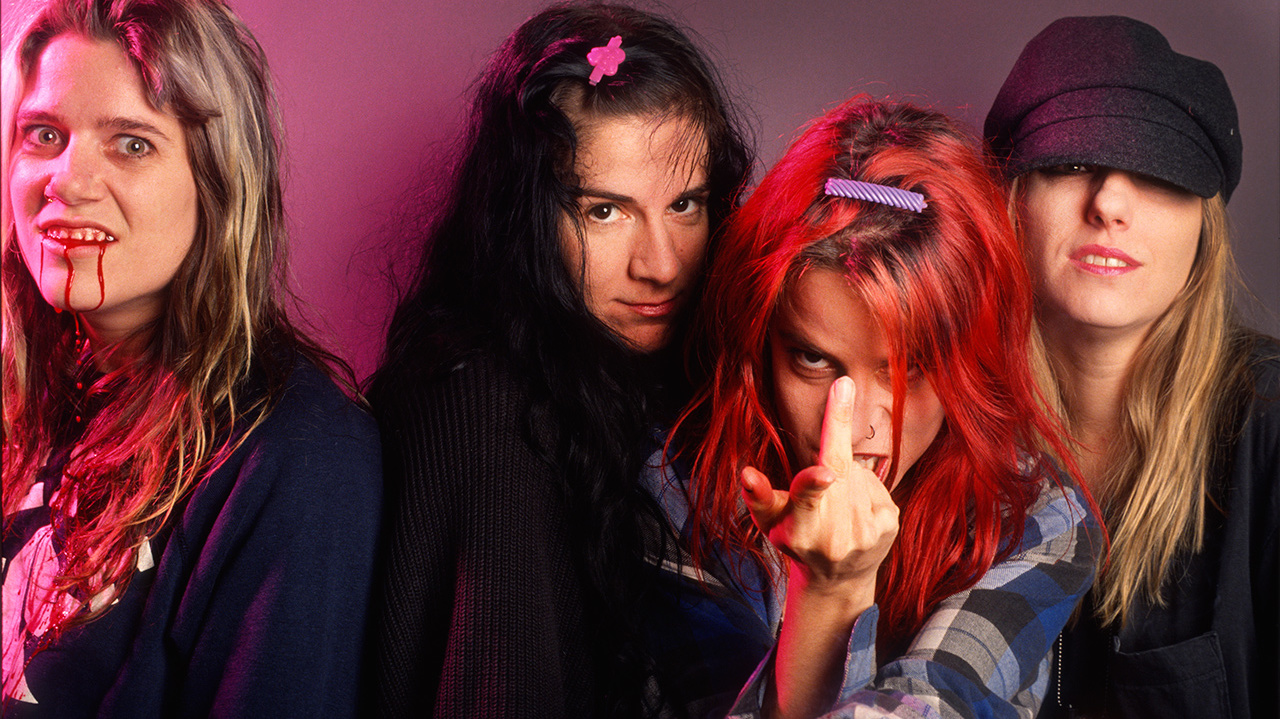6 things we learned from new documentary L7: Pretend We're Dead
From bad gigs to rampant roadies, these are the things we learned from new L7 documentary L7: Pretend We're Dead

Having being crowdfunded over two years ago, new rockumentary L7: Pretend We’re Dead is finally upon us. The film, which aims to tell the self-professed “rags to riches to rags” tale of 90s grunge pioneers L7, follows the band in nitty gritty detail, compiling a wealth of backstage footage documenting the highs and lows of their successes and struggles as a band, along with a series of talking head interviews from contemporaries and fans including Joan Jett, Lydia Lunch and Krist Novoselic.
We caught the film ahead of its premiere at London’s Doc’n Roll Festival, and these are the things we learned.
Don’t call L7 a girl band
One thing which is made clear from pretty much the first 10 minutes of the film is that L7 – and the numerous musicians interviewed – were absolutely sick, tired and frustrated of being constantly confronted with questions about being women in a band. Adeptly illustrated with interspersed TV footage, where interviewers clumsily stumble over questions obsessing on their gender, you start to feel that frustration right along with them. It also directly informed the image they created over the years, rejecting what they thought people would expect of them for something purposely “not pretty”. Or as Donita Sparks puts it, “If we were gonna be looked at, we were gonna be thrashin’”.
The LA scene was a weird place to be in the late 80s
Hopping from gigs with Agent Orange and Bad Religion one night to sharing bills with Mötley Crüe and Poison the next, the LA scene was confused in the late 80s, and L7 really didn’t know where their place in it really was – particularly because the scene seemed to struggle with the concept of women making “ugly” music. As a result, their move to Seattle in the 90s, where “all the men were feminists” and they were “just accepted as a band” was a breath of fresh air.
- The Story Behind L7's Pretend We're Dead
- Why I love L7 – by Harriet Bevan
- L7 'blown away' by comeback success
- Our TeamRock+ offer just got bigger. And louder.
A bad gig can be your biggest break
L7’s appearance at Reading Festival in 1992 – where they shared the bill with pals Nirvana, among others – has become the stuff of legend, and for good reason. For those not in the know, a combination of an unwilling crowd and shocking sound during their set caused restlessness and tension among the audience, who started pelting the band with mud. Dejected and covered in dirt, Sparks decided to retaliate, by removing her tampon and throwing it out into the crowd. Obviously, it resulted in a media frenzy which cemented L7 as one of the most outrageous bands in rock – which would only be solidified by their full-frontal appearance on The Word weeks later.
L7 roadies were a wild bunch
One of the low key highlights from the film’s footage is when we’re shown L7’s roadies storming the stages night after night, dressed up in everything from bondage tape to giant nappies, with only L7 stickers to preserve their modesty. Spurred on by Sparks and the rest of the band, they dance, writhe and gleefully let go of their inhibitions. It also helps to show that the relationship the band had with their crew was truly one of a big happy family; something which is thrown into sharp perspective when the band are later hit with the news that one of their roadies – and best friends, Umbar – has died while on their tour bus.
Nick Cave was the life and soul of the party
Another highlight of the footage comes from various cameos made by Nick Cave during L7’s stint at Lollapalooza Festival in 1994. Sparks goes rolling onto the stage on rollerskates during his set, before rugby tackling him to the ground mid-song – which he seems to find hilarious. Cut to their tour bus, and Cave is captured punching the air and singing along to the camera, drink in hand. Cut to their own live performance, and Cave can be spotted dancing away in the wings. Basically, Nick Cave was the dude you wanted to party with back in the day.
The latest news, features and interviews direct to your inbox, from the global home of alternative music.
You’ve got to know when to quit
As the latter part of the film shows, by the time the end of the 90s rolled around, the band were burned out and struggling to maintain momentum. Battling through unsuccessful album after unsuccessful album, with bassist Jennifer Finch unexpectedly quitting the band in 1996, the band’s final stabs at major league success – 1997’s The Beauty Process, which would become their poorest performing record ever, and 1999’s Slap-Happy, which was canned before it could be formally released – would ultimately finish them off for good. Sparks would then call the whole thing to a halt in 2001.
Catch the official London premiere ofL7: Pretend We’re Dead on 19 November at Hackney Picturehouse
Briony is the Editor in Chief of Louder and is in charge of sorting out who and what you see covered on the site. She started working with Metal Hammer, Classic Rock and Prog magazines back in 2015 and has been writing about music and entertainment in many guises since 2009. Her favourite-ever interviewee is either Billy Corgan or Kim Deal. She is a big fan of cats, Husker Du and pizza.

